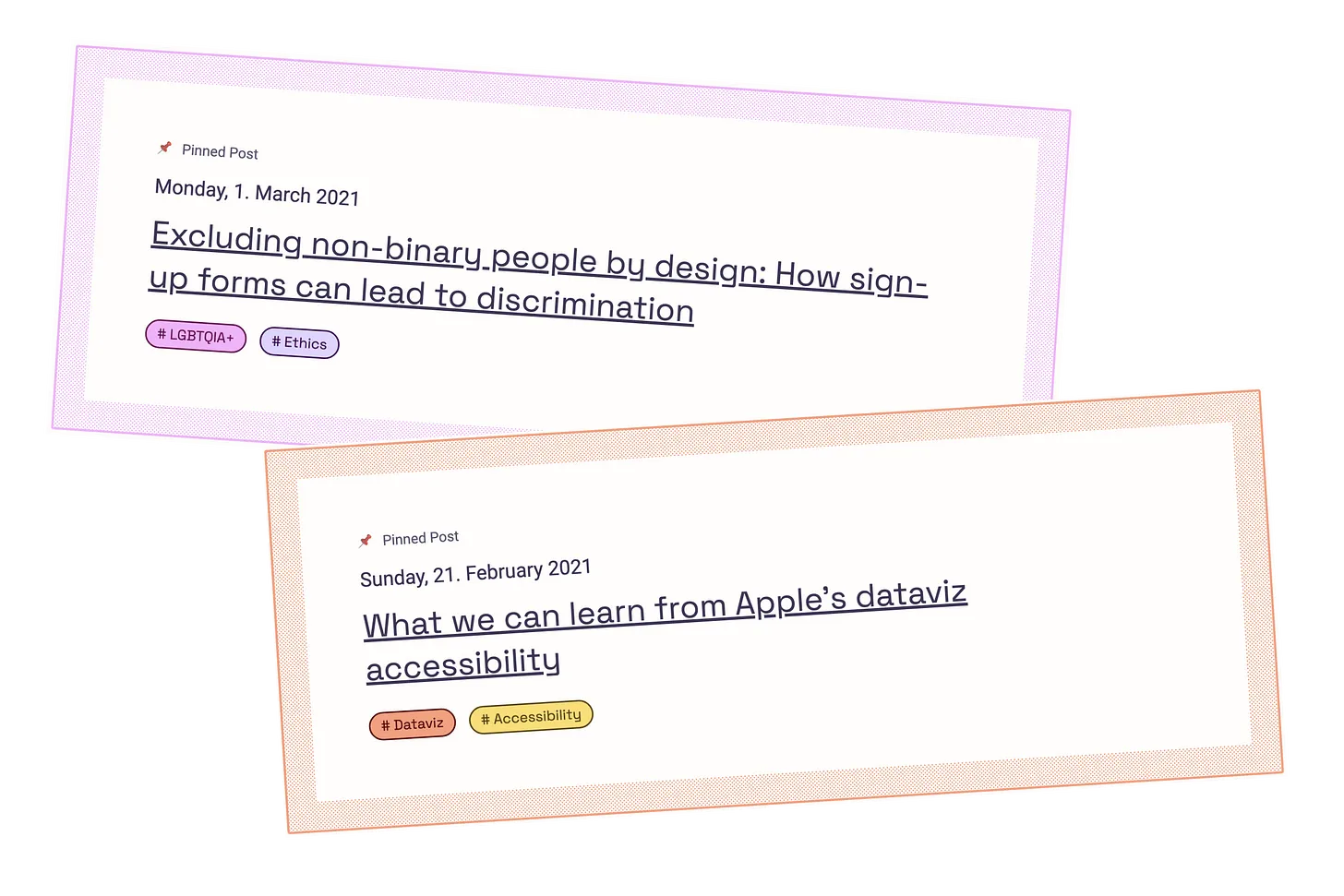Now more than ever we are being faced with a fork in the road of digital design. Accessible, representative, and inclusive digital spaces are in high demand, an expansive world of diverse needs that calls for immediate action. With their finger on the pulse of the ever-changing digital industries, we took some time to chat with Sarah about their perspective and practice, learning from their insight and expertise in accessible digital spaces.
Sarah Fossheim is an accessibility specialist, ethical designer and developer, located in Oslo, Norway, currently working as an independent consultant. They educate about design and tech on their own blog, and run an ethical design resource library and newsletter.
Driftime®: What is ethical design, and why is it important to talk about today? How does it benefit others/businesses?
Sarah: Technology is everywhere in our lives. There’s an app, service or algorithm for almost anything. We consume our news through social media, make online doctor appointments and hold meetings over zoom. Predictive policing software gets used to predict crime, the ads you see are tailored to your interests based on your online activity, and through facial recognition, Facebook can automatically tag you in pictures.
But a lot of things can, and do, go wrong. Social media enables the spread of misinformation and hate speech, predictive policing algorithms are biased against Black people, facial recognition still struggles to identify people of colour, 97.4% of the web is inaccessible to disabled people (who make up for 15-25% of the population), and the list goes on.
To me, ethical design is about mitigating those risks and minimising the harm we inflict on others or the planet. So I think of it as the principle of bringing ethics and inclusion into everything we do, rather than it being just one step in the design process.
I don’t like talking about the business value of ethics. In the end these are real human lives affected by the lack of inclusion, profit shouldn’t come into it.
"Prioritise the most vulnerable, and have a strategy"
Sarah Fossheim
How can businesses better support their people, both internally and externally, particularly those with marginalised identities and diverse needs?
Talk with us, not about us. There’s starting to be a lot more talk about accessibility in the tech and design field, yet our buildings, tools, culture and way of working are often inaccessible for disabled and neurodiverse folks.
I’ve come across a lot of companies highlighting their diverse and inclusive culture, yet rarely has that culture actually been inclusive towards me, a white non-binary queer immigrant. I’ve heard of immigrants from non-European countries being grossly underpaid, or people making fun of their accents or telling them to move back home. I know of several harassment stories within my own circle.
I think actually listening to us and trying to understand our needs can go a long way already, along with putting in an active effort to especially protect those with marginalised identities, even if that means stepping out of our comfort zone.
How can designers and businesses best navigate the complexities of accessibility and inclusivity, in a world where it's difficult to accommodate everyone?
I think some of Kim Crayton’s guiding principles summarise my thoughts well: prioritise the most vulnerable, and have a strategy.
It’s often those coming from marginalised backgrounds that are harmed the most when things go wrong. Given how Black people often become victims of police brutality, a biased algorithm sending police surveillance to a Black neighbourhood can have fatal consequences. Or by enforcing a real-name policy on social media, the safety of trans people and abuse victims are put at risk.
But not everything can be solved at once, and depending on the product, things can become quite complex. I think it’s important to start prioritising accessibility and ethics in your practice as early as possible, as well as incorporating these questions into existing processes and methods.
"We’ve been harming people and the planet for centuries"
Sarah FossheimAs an accessibility consultant and ethical designer, how do you see the future of the digital industry developing?
Honestly, sometimes I look at it in a really grim way. I look at the misinformation out there, or the racist algorithms, or the products where I can’t gender myself correctly, and it feels like an uphill battle.
But I also started seeing a broader interest in ethics and accessibility. The Ethical Design Guide newsletter is growing consistently, and a lot of clients reach out because they genuinely want to prioritise these things.
It gives me a lot of hope that we can continue growing towards an industry where we create more ethical products, in a more inclusive culture. We’ve been harming people and the planet for centuries, if we want to actually be innovative that’s something that needs to change.
Handpicked Links
💌 Take a look at Sarah’s Ethical Design Guide for a library of rich resources for digital creatives and the people they collaborate with.
👥 Want to know more? Have a read of Kim Crayton’s guiding principles for profit without oppression.
🌿 Get immersed in a growing digital garden of Black led creative ecosystems. #buildyourowntables



